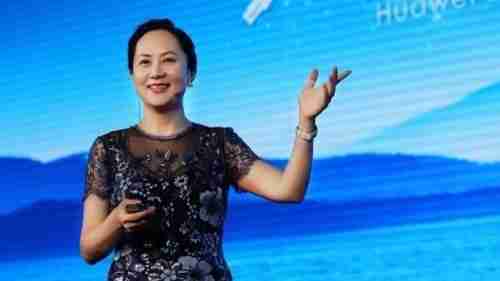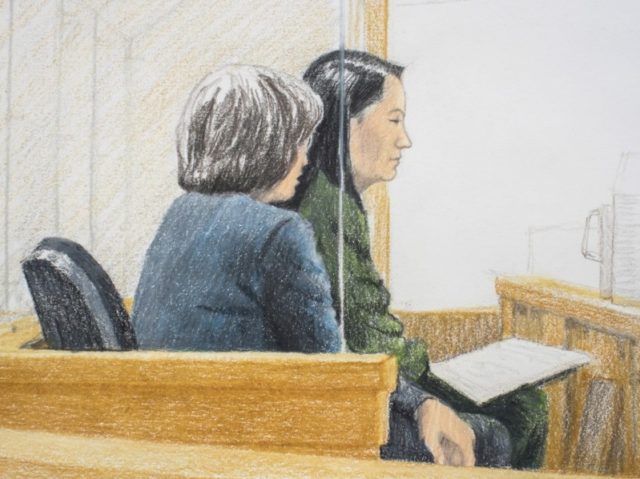This morning’s key headlines from GenerationalDynamics.com
- Huawei’s Meng Wanzhou faces possible 30-year jail term
- Japan blocks Huawei products from public infrastructure projects
- The story of Stern Hu, an employee of Australian mining company Rio Tinto
- Arrest of Meng Wanzhou of China’s Huawei has increasingly serious implications
Huawei’s Meng Wanzhou faces possible 30-year jail term

Meng Wanzhou (fensifuwu.com)
As we described yesterday, Huawei Technologies chief financial officer (CFO) Ms. Meng Wanzhou was arrested by Canadian police on Saturday, while changing planes in Vancouver. Meng is the daughter of Huawei founder Ren Zhengfei, who was previously an officer and engineer in China’s People’s Liberation Army (PLA). ( “7-Dec-18 World View – Canada arrests the chief financial officer of China powerhouse Huawei”)
Meng appeared in a Vancouver court on Friday, where the allegations were laid out:
- Meng is accused of overseeing a complex scheme to allow Huawei to sell networking infrastructure equipment to Iran in violation of U.S. sanctions.
- Meng is alleged to have created a Hong Kong-based shell company called Skycom to be used in her fraud scheme.
- Meng committed fraud in 2013 by telling banks and financial institutions that Huawei had no connection to Skycom, when in fact Skycom was a subsidiary of Huawei. An investigation by Reuters in 2013, for example, revealed that on linkedin.com several workers listed “Huawei-skycom” as an employer.
- These banks then cleared financial transactions for Huawei, inadvertently doing business with SkyCom and becoming “victim institutions” of fraud.
If convicted on all these charges, Meng faces up to 30 years in jail in the United States.
The Chinese government has called for Meng’s immediate release, saying that arresting her violates her “human rights.”
Meng’s lawyers are requesting bail, saying that she is not a flight risk because she would not risk embarrassing her father or her country by fleeing before her extradition hearing. However, Canadian prosecutors say that Meng is the daughter of the company’s billionaire founder, Ren Zhengfei, is a flight risk because of her wealth and the fact that she could face three decades in prison. Washington Post and Reuters (31-Jan-2013)
Japan blocks Huawei products from public infrastructure projects
For reasons that I described in detail in yesterday’s article, we have to assume that it is absolutely certain that any Huawei networking device can be controlled remotely by China’s military and used for espionage, and that it is impossible to detect this.
On Friday, Japan’s government said that it will exclude Chinese telecommunication equipment-makers Huawei Technologies Co. and ZTE Corp. from public procurement because of security concerns.
Japan joins the United States, Australia and New Zealand in implementing such a ban. Canada, Britain and the European Union are investigating security issues, although Germany’s interior ministry opposes banning Huawei. Japan Times and BBC
The story of Stern Hu, an employee of Australian mining company Rio Tinto
An example of how Meng Wanzhou might be treated is the tale of Stern Hu, an executive in Australian firm Rio Tinto who was jailed in 2009 and only freed four months ago.
Hu was apparently one of the millions of peaceful student protesters in the 1989 Tiananmen Square protests that Chinese authorities ended on June 4, 1989, with a bloody massacre that killed thousands of students.
Hu used to work for China International Trust and Investment Co, until a photo surfaced in a magazine showing him participating in the Tiananmen Square protests, at which time he was fired. He traveled to Australia, became an Australian citizen, and in 1996 joined a company that went on to become the international mining giant Rio Tinto. Hu became head of Rio Tinto’s iron ore business in China.
In 2010, Hu and three other Rio Tinto executives were given hefty jail sentences on charges of corruption and bribery for bribing executives from Chinese steel companies to sign contracts with Rio Tinto. Hu was given a ten-year jail sentence, but he was released in July of this year for good behavior.
The incarceration of Hu Stern can provide precedents for how the case of Meng Wanzhou should be resolved. Telegraph (London, 28-Jul-2009) and Australian Broadcasting (5-Aug-2010) and Mining.com and Washington Post
Arrest of Meng Wanzhou of China’s Huawei has increasingly serious implications
In yesterday’s article, I speculated that the Trump administration will decide to de-escalate this situation quickly by returning Meng to China as soon as possible, in order to avoid risking the current “ceasefire” in the trade war between the U.S. and China.
However, some analysts point out that the opposite may be true because, otherwise, our allies may not continue to support us. ZTE is another Chinese company that was severely sanctioned for making illegal sales to Iran. The Trump administration heavily sanctioned ZTE, but the sanctions were reversed as the result of a personal plea by Xi Jinping to Donald Trump. This reversal, according to analysts, confused our allies, who wonder how serious the Trump administration is about enforcing the sanctions against Iran.
Furthermore, Meng went far beyond simply violating U.S. sanctions laws. She set up a complex international system, defrauding banks in several countries, and therefore violating several countries’ laws, and so Meng cannot be excused unless these other countries agree.
This reasoning indicates that the Trump administration is going to have to follow a hard line in the case of Meng, including giving her a jail sentence, as in the case of the Rio Tinto executive.
At the same time, the Chinese are becoming increasingly infuriated by Meng’s arrest. Huawei is perhaps the most respected company in China, and many Chinese people are viewing the arrest of Meng and the banning of Huawei products as part of a policy to contain China.
Chinese people, including Xi Jinping, claim that China has been repeatedly humiliated by countries of the West, starting with the Opium Wars in the 1840s. ( “21-Mar-18 World View — Xi Jinping invokes the 1840s Opium Wars to justify military action for China’s ‘rejuvenation'”)
Some Chinese are saying that the campaign against Huawei is a continuation of the West’s policy of humiliating China and containing China.
As the world goes deeper into a generational Crisis era, countries of the world are becoming increasingly xenophobic and nationalistic and that, eventually, this leads to a new generational crisis war. Generational Dynamics predicts that China and the US are headed for a new world war. The Huawei situation has resulted an increase in xenophobia and nationalism in both countries, bringing us one step closer to that world war. Al Jazeera
Related Articles:
- Canada arrests the chief financial officer of China powerhouse Huawei (07-Dec-2018)
- Donald Trump and Xi Jinping agree to a 90 day moratorium in trade war (02-Dec-2018)
- Mike Pence’s China ‘containment’ speech signals more contentious US-China relations (26-Oct-2018)
- Australia passes foreign influence laws, targeting China (29-Jun-2018)
- Xi Jinping invokes the 1840s Opium Wars to justify military action for China’s ‘rejuvenation’ (21-Mar-2018)
- Huawei scandal exposes potential ‘Cyberwar Pearl Harbor’ from China (14-Oct-2012)
KEYS: Generational Dynamics, Meng Wanzhou, China, Huawei Technologies, Ren Zhengfei, People’s Liberation Army, PLA, Xi Jinping, John Iran, ZTE, Skycom, United States, Britain, Canada, Australia, New Zealand, Japan, Hu Stern, Tiananmen Square, Rio Tinto, Opium Wars
Permanent web link to this article
Receive daily World View columns by e-mail

COMMENTS
Please let us know if you're having issues with commenting.